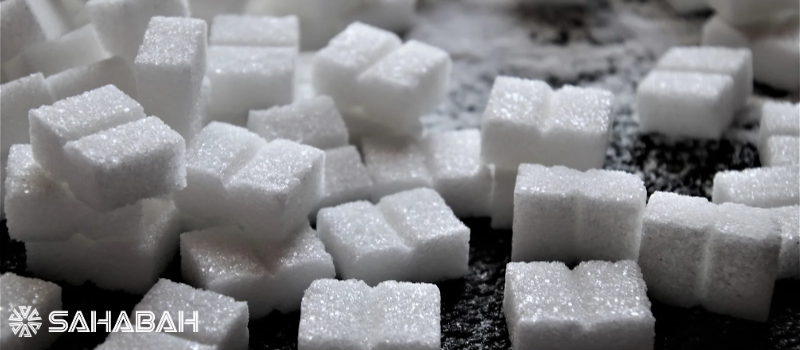Erythritol is a popular sugar alcohol that is used as a zero-calorie sweetener in many products, especially low-carb and keto-friendly foods. Structurally, it is similar to sugar alcohols like xylitol, sorbitol, and maltitol. However, there are some key differences between erythritol and other sugar alcohols that are relevant when evaluating its permissibility within Islamic dietary laws.
This article will provide an in-depth look at what erythritol is, how it is produced, its health effects and common uses, and an analysis of the factors that determine whether erythritol is considered halal or haram for Muslim consumers. With sugar intake increasingly linked to obesity, diabetes, and other health risks, sugar alcohol substitutes like erythritol offer appealing options for those looking to reduce sugar consumption while adhering to religious dietary standards.
Overview of Halal Food Requirements
In order for a food or ingredient to be considered halal, it must comply with Islamic dietary regulations outlined primarily in the Quran. Here are some of the key requirements that must be met for halal certification:
-
Cannot contain any ingredients expressly prohibited in the Quran such as pork, blood, carrion, alcohol, etc. All additives and flavorings must also meet halal standards.
-
Any meat or poultry ingredients must come from animals that were slaughtered in the appropriate zabiha halal manner.
-
Cannot contain traces of alcohol that was used in flavorings or components added during processing and manufacturing.
-
Should not be processed on equipment that has previously handled haram ingredients. Must avoid cross-contamination.
-
Should not contain ingredients whose origins or sources are questionable or unknown. Complete transparency is ideal.
The reason sugar alcohols sometimes raise concerns is because trace amounts of alcohol may remain after the fermentation process used in production. The alcohol itself (known as ethanol) would be considered haram.
Erythritol Production Process and Origins
Most erythritol used in foods and beverages today is commercially produced through fermentation of glucose extracted from corn or wheat. This carbohydrate feedstock is fermented by yeast or certain bacteria that naturally produce erythritol.
The initial fermentation process does result in trace amounts of alcohol as a byproduct. However, manufacturers use evaporation, distillation, and filtration to remove all traces of ethanol, yeast cells, proteins and enzymes. Only the pure erythritol remains, with no detectable alcohol content.
Erythritol also occurs naturally in some fruits and foods in small quantities. It was first discovered in 1848 in wine, and has since been found in mushrooms, pears, grapes, cheese, soy sauce, and other fermented foods. Some Islamic scholars argue that if erythritol occurs naturally in certain halal foods and beverages, then consuming it as an isolated ingredient or sweetener should also be permissible.
Reasons Why Erythritol is Generally Considered Halal
There are several important reasons why the vast majority of Islamic organizations and Muslim-majority countries recognize erythritol as a halal sweetener:
Erythritol Itself Contains No Alcohol
Unlike some other sugar alcohols, the erythritol molecule does not contain alcohol groups. The “alcohol” refers only to its origin from the initial fermentation process. Extensive purification ensures no alcohol remains in the end product.
It Has Natural Origins
Since erythritol also occurs naturally in some halal foods like grapes, mushrooms, and pears, most scholars consider the commercial production process valid if it is purified sufficiently.
No Cross-Contamination
Manufacturers avoid cross-contamination by using dedicated equipment and erythritol-only production lines. This prevents contact with questionable ingredients.
Gets Halal-Certified
To provide added assurance to Muslim consumers, many major erythritol manufacturers go through halal certification processes. This further validates its acceptability.
Approved in Islamic Countries
Countries like Saudi Arabia, Pakistan, and Malaysia allow and broadly endorse the use of erythritol in food and beverage products, considering it halal-compliant.
Health Profile of Erythritol
In addition to conforming to halal diet standards, erythritol has some other compelling benefits that make it an appealing sugar substitute:
-
Zero calories and zero glycemic impact. Does not affect blood sugar or insulin levels.
-
Does not promote tooth decay like sugar. Excellent for dental health.
-
Approximately 70% as sweet as sugar, allowing easy 1:1 substitution in recipes.
-
Well-tolerated even in larger doses for most people. Less likely to cause digestive issues compared to some sugar alcohols.
-
Does not contribute to obesity, metabolic disease, or other health risks linked to excessive sugar consumption.
-
Naturally enhancing flavor and sweetness of foods and beverages without compromising nutritional quality.
With rising rates of obesity, diabetes, and other chronic diseases related to excessive sugar intake, erythritol offers a compelling way for Muslim consumers to reduce added sugar without having to eliminate sweet flavors entirely.
Common Uses and Benefits
Erythritol is commonly used in the following types of products:
Beverages – Added to soft drinks, vitamin waters, electrolyte drinks, teas, and coffees as a zero-calorie sweetening option.
Baked Goods – Used in sugar-free versions of cakes, cookies, muffins, breads, and pastries. Requires some recipe adjustments.
Confections – Found in sugar-free candy, chocolate, and gummy supplements. Allows sweet treats without sugar content.
Frozen Desserts – Added to ice cream, sherbet, and sorbet to provide sweetness without affecting texture.
Jams and Jellies – Used to sweeten and enhance fruit spreads and preserves that need less added sugar.
Personal Care – Sometimes included in sugar-free chewing gum, mouthwash, toothpaste, and other oral hygiene products.
Medications – Added as a sweetener, filler, and stabilizer in some pharmaceuticals, vitamins, cough drops and lozenges.
Tooth-Friendly – Does not contribute to cavities, dental caries, or enamel erosion making it safe for teeth.
Low Carb/Keto – Has no impact on blood glucose levels, insulin, or ketosis making it popular in low-carb and keto products.
Weight Loss – Eliminates calories from added sugars supporting weight control and fat loss efforts.
As you can see, erythritol provides a versatile way to reduce added sugars and limit calories without sacrificing sweetness and flavor. This aligns nicely with Islamic principles of moderation and healthful eating.
Erythritol Side Effects and Safety
Multiple studies and reviews have affirmed erythritol’s safety for human consumption. Here are some of the most common side effects to be aware of:
-
Digestive Upset – In very high doses, erythritol may cause nausea, stomach rumbling, gas, or diarrhea in sensitive individuals. Start slow.
-
Allergic Reactions – Very rare, but allergy is possible. Discontinue use if any signs of allergic reaction emerge.
-
Headaches – Possible in some people when consuming excessive amounts. Moderation is key.
Overall, erythritol is considered one of the best tolerated and safest sugar alcohols. Consumed in moderate amounts, the vast majority of people can use it without issue. There are no known long-term health risks.
The Verdict on Erythritol’s Halal Status
Analyzing all the available information and weighing the various factors involved, the preponderance of evidence seems to clearly indicate that erythritol is halal-compliant:
-
Erythritol itself contains no alcohol or other prohibited components
-
Purification processes remove trace alcohol from initial fermentation
-
Occurs naturally in some fruits and fermented foods
-
Gets halal-certified by numerous organizations
-
Approved for use in Muslim-majority countries
-
Promotes health by substituting added sugars
Unless someone adheres to a very strict or conservative interpretation of Islamic dietary laws, erythritol avoids the common concerns associated with sugar alcohols and appears to qualify as a halal sweetener option. Nevertheless, carefully checking labels and contacting manufacturers for certifications can provide added assurance for Muslim consumers.
The Future Looks Bright for Halal-Conscious Consumers
The ability to reduce added sugars without restricting access to naturally sweet foods and beverages is a valuable benefit made possible by erythritol and similar sugar alcohol sweeteners. While everyone’s level of scrutiny and standards for permissibility may vary, the case for designating erythritol as halal seems quite compelling.
Moving forward, manufacturers will hopefully continue producing high-purity erythritol in dedicated facilities to prevent any potential cross-contamination issues. And more third-party halal certification programs will help validate the acceptability of products containing erythritol. This will give observant Muslims more options to enjoy sweet foods and beverages in accordance with their faith and health goals.
Frequently Asked Questions: Is Erythritol Halal
What is Erythritol?
Erythritol is a type of sugar alcohol that is often used as a sugar substitute in food and beverage products. It is a naturally occurring sweetener found in some fruits, but it is primarily produced through fermentation of glucose from corn or wheat starch.
Is Erythritol Halal?
Erythritol is considered halal and permissible for consumption by Muslims, as it is a sugar alcohol and does not contain ethanol or any alcoholic beverages. It has been halal certified by various halal certifying bodies in accordance with Islamic law.
Can Muslims consume products containing Erythritol?
Yes, Muslims can consume products containing Erythritol as it has been determined to be halal and does not violate Islamic dietary guidelines. It is commonly used as a halal sweetener in various food and drink items.
How does Erythritol compare to other sugar alcohols?
Erythritol is similar to other sugar alcohols such as Xylitol, Sorbitol, Mannitol, and Maltitol, but it is distinguished by its lack of impact on blood sugar and low calorie contentsugar-free or low-calorie alternative.





